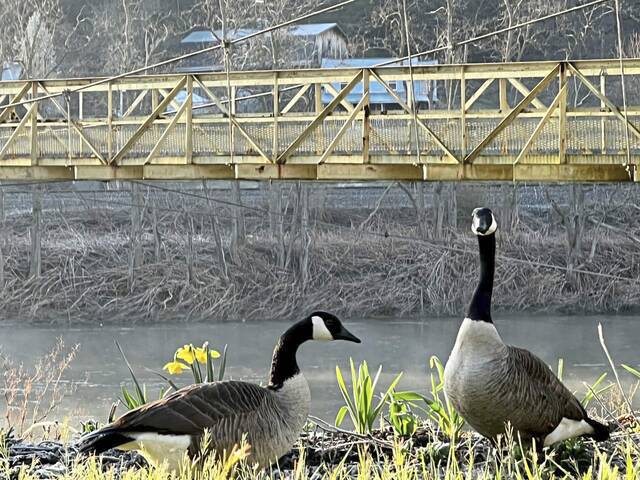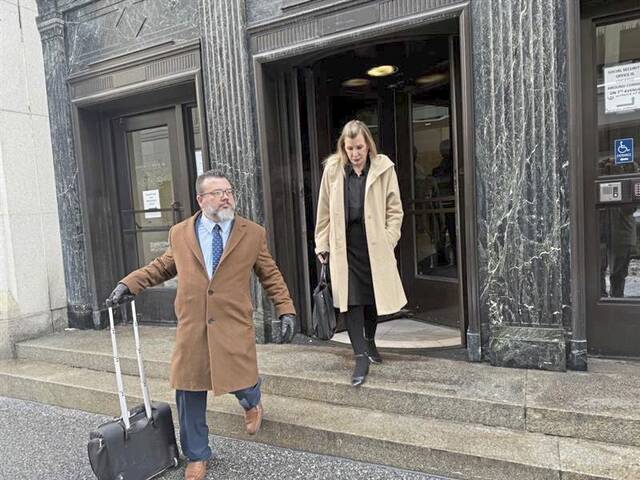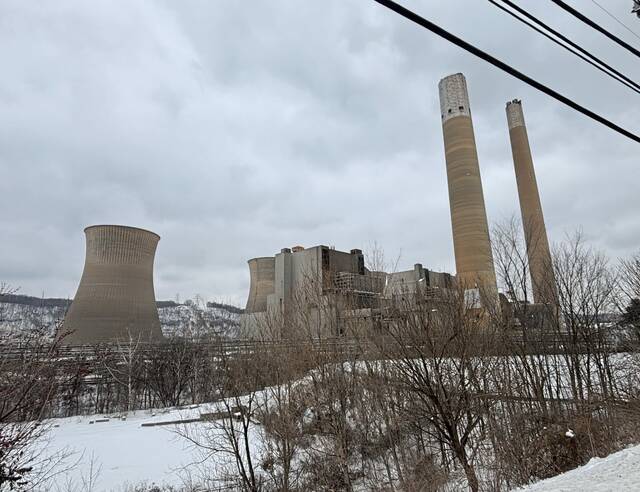Defense attorneys for two men accused of poisoning dozens of birds at a Lawrence County farm in 2020 because the birds were damaging their soybean crop said that the government’s theory of the case doesn’t make sense.
“We’re supposed to believe Robert Yost was so spiteful he just laid that contaminated corn right up against the plants he’s trying to cultivate?” argued Yost’s defense attorney, Stephen Colafella. “That makes no sense.”
Yost, 51, of New Galilee, and Jacob Reese, 26, of Enon Valley, are charged with conspiracy; unlawful use of a registered, restricted pesticide and unlawful killing of migratory birds, which are federally protected because they travel through Canada, the United States and Mexico. The government said the men killed 17 geese, a mallard duck and seven red-winged blackbirds.
The two men elected to have a misdemeanor bench trial before U.S. District Judge W. Scott Hardy. The trial began on Monday and ended Tuesday afternoon with closing arguments. Neither defendant testified.
Hardy issued a briefing schedule, asking both sides to provided findings of fact and conclusions of law. The deadline for the filings isn’t until Jan. 10.
Hardy will rule after that.
During the two-day trial, Assistant U.S. Attorney Jacqueline Brown said that Yost and Reese attempted to get rid of the Canadian geese that were destroying their crops in June 2020 — first by trying to scare them with shotgun blasts, and then by using leg traps.
But when those didn’t work, Brown said the men resorted to carbofuran, a pesticide declared unsafe by the Environmental Protection Agency in 2009.
“Nobody else had a motive,” Brown told the judge. “There is no doubt Mr. Reese and Mr. Yost conspired to distribute poisoned corn.”
But Colafella argued on Tuesday that there is no direct evidence tying his client to the crime, and that the case is entirely circumstantial.
“The government’s positions appears to be — ‘if not them, who else?’” Colafella said. “That’s a dangerous position.”
On Monday, two co-owners of the 56-acre property — which Yost leases to farm — testified about the events of June 2020.
Theresa Edwards, who said she takes photos as a hobby, told the court that the day before the birds were found dead on June 23, 2020, she took pictures of Reese, shirtless and in jeans, spreading a grain-like material out of a bag on the back of a UTV with a shovel along the edge of the wetlands on their property.
State Game Commission Officer Byron Gibbs testified that there was a trail of about 100 yards of carbofuran laced corn found near the dead birds.
When Gibbs confronted Yost and Reese later that day after obtaining a search warrant, he said both men admitted Reese had spread “seed corn” in the area, hoping to feed the birds to keep them from eating the crop.
Both men denied poisoning the birds. When Gibbs asked to see the bag of corn Reese had been photographed spreading, Reese told him he had burned it.
During defense closings on Tuesday, Colafella said that the government’s theory that Yost was “willing to take whatever methods necessary” to stop the geese’ destruction are not tenable.
At each step when the Edwards’ family raised concerns about the use of the shotgun to scare the birds, and asked Yost to remove the traps, he did so without argument, Colafella said.
Still, the government is trying to imply that Yost is “that brazen, that inconsiderate, that jaded, that callous, that he decided, ‘screw the Edwardses, we’re going to lay down some laced corn and take out all the wildlife.’”
It also made no sense, Colafella said, that his client and Reese would go to the trouble to burn the bag of empty yellow kernel corn the government alleges was poisoned, but then leave the dead birds in a field visible from the road.
Defense attorney Steven C. Townsend said the judge needed to decide the case based on credibility of witnesses. He specifically referenced Edwards and the pictures she claimed she took of Reese the day before the birds were found.
Although Edwards testified that she took the photos on June 22, 2020, the digital metadata for the pictures showed they were taken on June 17.
That, alone, raises reasonable doubt, Townsend said.
“This doesn’t just cause you to pause about one thing,” he said. “It causes you to paused about a lot of things.”
Further, Townsend told the court it didn’t make sense that the birds would be poisoned only at one area of wetlands, when there were five or six other areas on the property. Townsend argued that his client would not have spread poisoned corn while wearing no protective gear, like gloves or a mask.
“Your honor, there has to be some level of common sense to this thing,” he said. “Mr. Reese never admitted to spreading any poisoned corn.”








